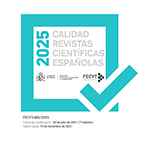Territorialization, Control and Land Grabbing for the Implementation of an Agro-Industrial Model in the Colombian Altillanura
Abstract
This article analyzes the relationship between the control of the land, the exercise of violence and its correlation with territorialization processes based on dispossession, hoarding, enclosure and legalization of land from a temporal and spatial dimension. Based on a recent case study such as that of the El Brasil farm, the lands of La Fazenda in the Colombian Altillanura, it exposed how the properties belonging to the ancestral territory of the indigenous communities, recognized as vacant territories, were adjudicated by the State to peasants dispossessed by armed groups to be accumulated, marketed and legalized for agro-industrial exploitation later. From a qualitative documentary study, it is suggested that peasant and indigenous communities are dispossessed of the land and subjected to new forms of capitalist relationship within the framework of a rural development model that privileges agribusiness, emphasizing in the examination of the socio-historical and geographical relations of the inequalities that make possible and maintain dispossession.
Downloads
Article download
License
In order to support the global exchange of knowledge, the journal Geopolítica (s) Revista de estudios sobre espacio y poder is allowing unrestricted access to its content as from its publication in this electronic edition, and as such it is an open-access journal. The originals published in this journal are the property of the Complutense University of Madrid and any reproduction thereof in full or in part must cite the source. All content is distributed under a Creative Commons Attribution 4.0 use and distribution licence (CC BY 4.0). This circumstance must be expressly stated in these terms where necessary. You can view the summary and the complete legal text of the licence.









